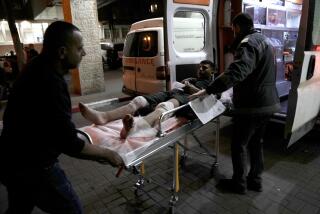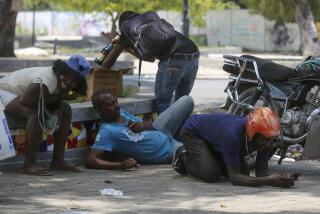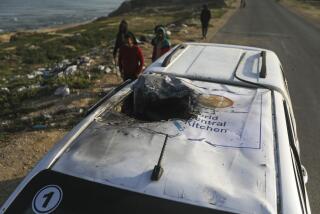Aid Worker in Indonesia Escaped Executioners to Tell His Tale
JAKARTA, Indonesia — Nazaruddin Abdul Gani, a humanitarian aid worker, knew he was about to die. He watched a killing squad take two of his co-workers to an abandoned house, force them to the ground and shoot them.
Moments later, as he and a third colleague were marched at gunpoint to the same building in only their underwear, Nazaruddin took off running into a field of tall grass. The killers gunned down his companion and emptied their automatic rifles in his direction. Somehow he reached safety in the jungle.
Nazaruddin’s narrow escape and his chilling account of the slaying of his three fellow aid workers last Wednesday provide stark evidence of the brutal war being waged by pro-government forces against civilians in Aceh, Indonesia’s northernmost province.
Such killings in Aceh are not unusual. What is rare is for an eyewitness to survive.
Nazaruddin, an employee of the Danish-sponsored humanitarian group RATA, believes that the killers were connected to the Indonesian army. He says he hid in the homes of villagers for several days until organizations including Human Rights Watch helped him flee to Jakarta, the Indonesian capital.
“I was very afraid that the military would come look for me in the village where I was hiding,” said Nazaruddin, 22, who still has cuts on his lip, scalp and hand from the beating he said his abductors gave him. “I’m afraid to go back to Aceh.”
Two Men, One Woman Shot to Death
Col. Kusdini, a spokesman for the Indonesian army in Banda Aceh, the Acehnese provincial capital, said the military is investigating the killings. The bodies of the three humanitarian workers--two men and a woman--were found at the ruined house outside the city of Lhokseumawe, said Kusdini, who, like many Indonesians, uses only one name. Their wrists were red where they had been tied before they were shot, he said.
Indonesian President Abdurrahman Wahid expressed regret this week about the killings, saying, “The incident has become an international issue and is very harmful for us.”
Rebels in Aceh, a predominantly Muslim province at the northern end of Sumatra island, have fought a 24-year war of independence that has claimed thousands of lives. By some estimates, the separatists now control two-thirds of Aceh’s territory and half its population.
Many had hoped that the fall of dictator Suharto in 1998 and the election of Wahid last year would lead to a peaceful resolution of the conflict. The Acehnese are seeking a local referendum on independence for their province, like the one the residents of East Timor province held in August 1999, but they have found little support for the idea in Jakarta.
Wahid’s government and the main separatist group, the Free Aceh Movement, agreed this year to a “humanitarian pause” in the fighting, but Wahid appears unable to control Indonesia’s powerful armed forces, and the killing has continued. The president is scheduled to visit Aceh next week.
Both sides commit atrocities, and civilians are often the victims. But activists and aid workers connected with nongovernmental organizations appear to be specific targets of the pro-government forces.
Human rights activist Jafar Siddiq Hamzah, an Aceh native who had moved to New York, returned to Sumatra last summer to document human rights violations in Aceh. He was found dead in September with four other people outside the city of Medan, south of the province.
Since March, Nazaruddin has worked as a field assistant for the Danish-funded Rehabilitation Action for Torture Victims in Aceh, or RATA. Its goal is to help the thousands of people who have been tortured by both sides in the conflict, said Michael Sternberg, the Danish ambassador to Indonesia, who helped found the group.
At its largest, the organization employed 39 field workers and nurses whose job was to seek out torture victims in Aceh’s towns and villages and provide them with counseling and rehabilitation.
Sternberg said the killing of the RATA workers was especially disturbing since all sides in the conflict had agreed earlier this year to permit the group to carry out its work.
“The view of the people who did this is that no independent NGO [nongovernmental organization] should be able to witness what is going on in the countryside,” he said.
Nazaruddin, who previously worked for the Indonesian Red Cross, was traveling last Wednesday from village to village with three co-workers--Ernita binti Wahab, 23, a nurse; Idriss, 27, a field assistant; and Bakhtiar, 24, a volunteer--when they were stopped by three vehicles carrying about 14 men.
Nazaruddin identified two of the men as Ampon Thayeb and Madya, who he said are widely known as government informers. About 10 of the men appeared to be Indonesian soldiers, although they were not wearing proper uniforms. Most of the men were armed.
The gunmen robbed the four aid workers of their valuables and questioned them about their activities, especially their ability to cross into rebel-held territory. The gunmen grew angry, accused them of lying and cooperating with the rebels, and began beating them with fists and rifle butts.
Attack Recorded With Large Camera
Nazaruddin said one of the men pointed a gun at his forehead and threatened to shoot, then moved the gun slightly to the side and pulled the trigger. Another gunman recorded the entire incident with a large shoulder-supported camera.
When the gunmen realized that a nearby family had witnessed the beating, they ordered the family, including at least two children, into one of the vehicles. The members of the family were held prisoner for hours, but it is unclear what happened to them.
The convoy drove around the countryside and the questioning continued. Along the way, the vehicles stopped at at least three military posts where the gunmen talked with soldiers and the soldiers peered in at the captives. No one made an effort to help the prisoners.
Before reaching the ruined house, the convoy stopped and Thayeb demanded that they tell all, Nazaruddin said.
“Now you are going to confess and say what’s what if you want to live,” Nazaruddin recalls him saying.
“What can we confess?” one of the aid workers said. “We are just volunteers.”
“Then it’s clear you want to die,” Thayeb responded, according to Nazaruddin’s account.
At some point, the four were ordered to strip to their underwear. The armed men tied the prisoners’ hands in front of them. One of the gunmen put a pistol in Ernita’s mouth, and she pleaded with him not to pull the trigger.
Two vehicles carrying the aid workers and several gunmen reached the abandoned house. At first, only Ernita and Idriss were ordered out. As the cameraman recorded the events, two gunmen forced Ernita and Idriss to the ground and killed them with one bullet each.
Seeing the fate that awaited them, Nazaruddin and Bakhtiar desperately tried to untie each other. By the time the gunmen came for them, Nazaruddin had freed his hands, but he pretended that they were still tied as he marched toward the house. Close to the shoulder-high grass, he broke into a run, zigzagging and falling down as the gunmen fired their weapons. Perhaps because it was almost sunset, the killers did not follow him into the jungle.
Nurdin Abdul Rahman, the director of RATA, said he believes that the gunmen knew exactly who the four aid workers were and had been following them at the time of the abduction.
“They were picked out deliberately,” he said.
“It’s really sad. These were very hard-working people and very dedicated to humanitarian activities. They [the gunmen] felt they were above the law and could act with impunity.”
More to Read
Sign up for Essential California
The most important California stories and recommendations in your inbox every morning.
You may occasionally receive promotional content from the Los Angeles Times.










